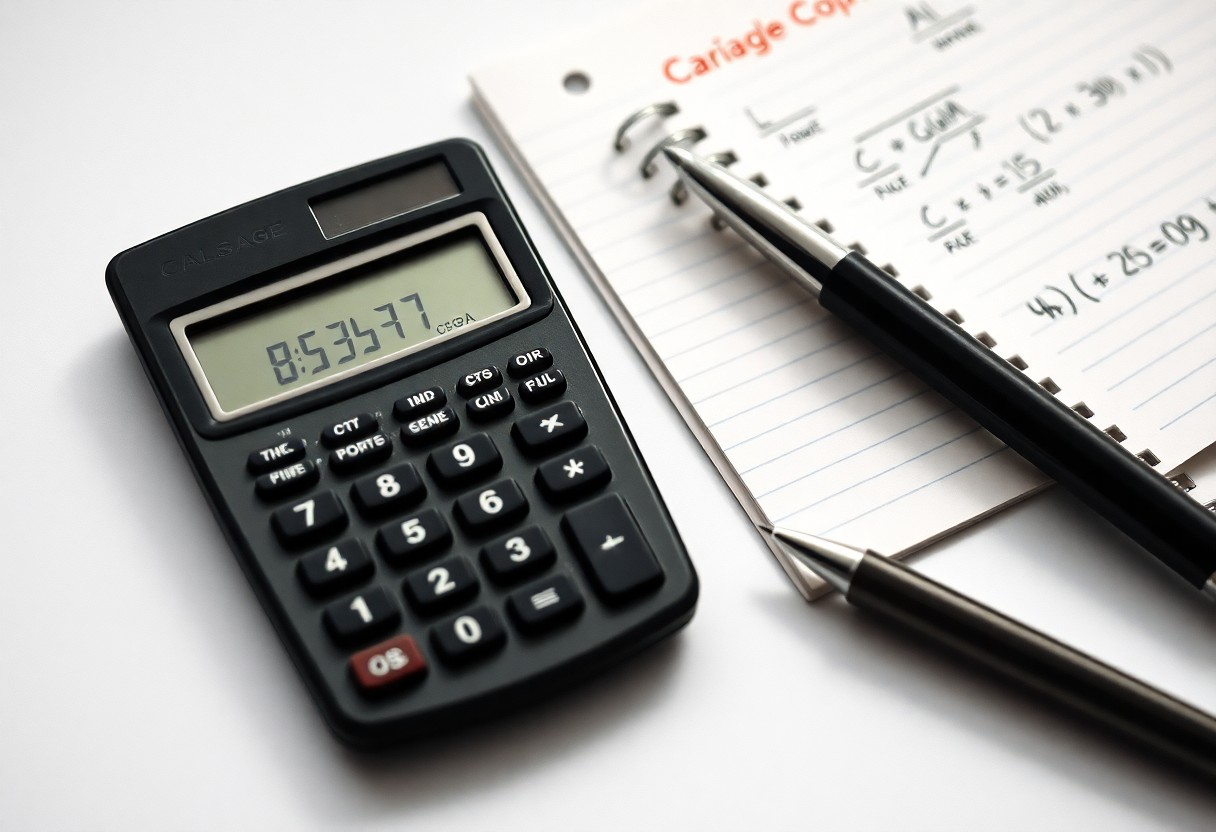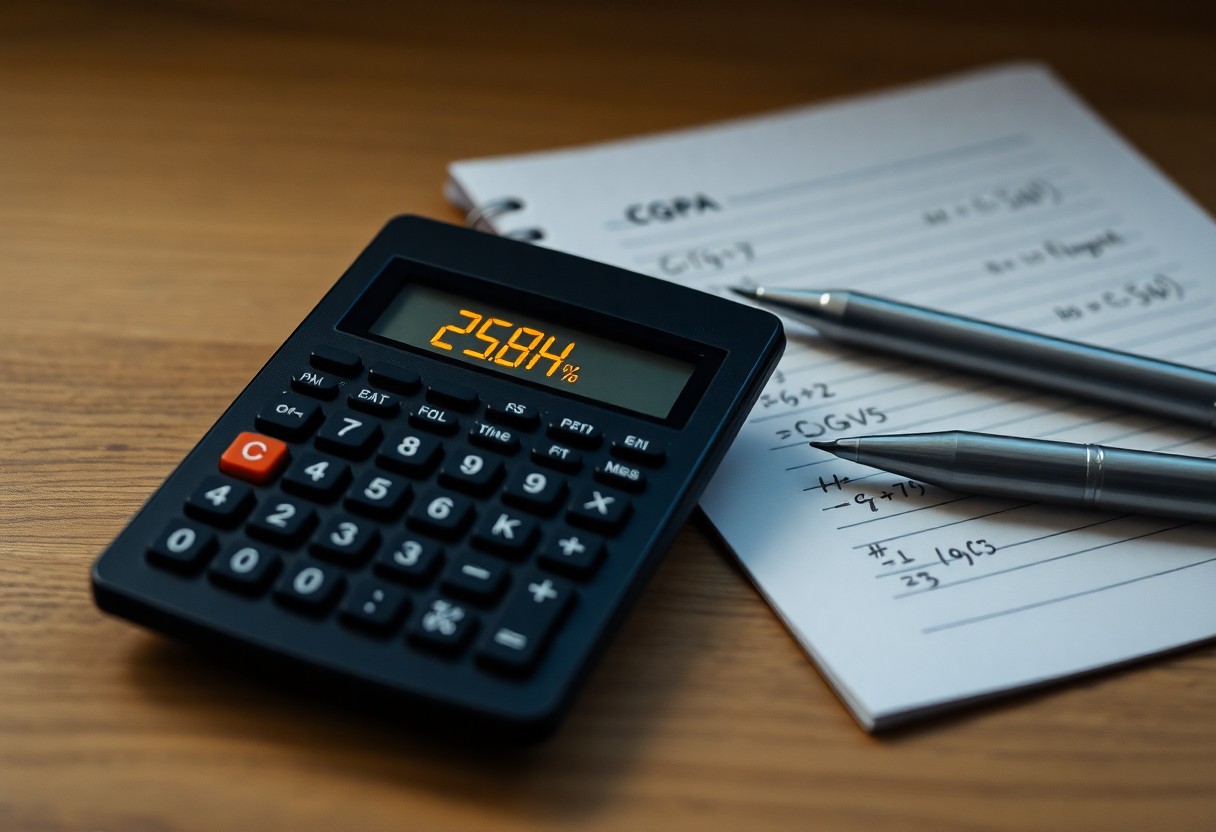Many students find themselves needing to convert their percentage grades to CGPA for various academic purposes. This conversion can play a vital role in your academic profile, especially when applying for certain colleges or internships. By following a simple formula, you can ensure accurate results and maintain a strong academic standing. In this guide, you’ll learn the straightforward steps to convert your percentage to CGPA, allowing you to present your scores effectively and confidently.
Table of Contents
Key Takeaways:
- Understand the Scale: Different educational institutions use varying grading scales, so it’s vital to know the specific conversion formula for your institution.
- Use the Formula: Commonly, CGPA can be calculated by dividing the total grade points earned by the total credits; for percentages, the CGPA can often be approximated using the formula: CGPA = (Percentage / 100) * Maximum CGPA.
- Check for Weightage: Some programs assign different weightages to courses, so ensure you consider the credit hours of each course when converting from percentage to CGPA.
Understanding Percentage and CGPA
To effectively navigate your academic journey, it’s necessary to comprehend the distinction between percentages and CGPA (Cumulative Grade Point Average). While both serve as measures of academic performance, they have different structures and implications for your overall evaluation. Understanding how each system works can help you better analyze your achievements and set future goals.
Definition of Percentage
There’s a straightforward relationship between your scores and percentage, calculated by taking the number of points you earned out of the total possible points and multiplying by 100. This value represents your performance in a specific subject or course, colloquially reflecting your mastery of the material.
Definition of CGPA
With CGPA, you’ll encounter a slightly more complicated but holistic approach to assessing your academic performance. It aggregates your grade points from various subjects, weighted by their credit hours and expressed on a scale, typically ranging from 0 to 10.
To understand CGPA better, it’s critical to grasp that it not only consolidates your performance across multiple subjects but can also have profound implications for your academic standing. A higher CGPA may enhance your eligibility for scholarships, internships, or further studies, thus shaping your academic trajectory and career prospects. It’s important to track your CGPA consistently, as fluctuations can affect your future academic opportunities and career pathways.
How to Convert Percentage to CGPA
Clearly, understanding how to convert your percentage to CGPA is imperative for academic assessments and performance evaluations. The conversion allows for a standardized measure of your achievements, helping in further education or job applications.
Step-by-Step Conversion Process
You can follow this straightforward table to convert your percentage into CGPA:
| Percentage | CGPA |
| 40% | 4.0 |
| 50% | 5.0 |
| 60% | 6.0 |
| 70% | 7.0 |
| 80% | 8.0 |
| 90% | 9.0 |
Example Calculations
If you have a percentage of 75%, you can quickly find your CGPA by using the conversion criteria. In this case, 75% would correspond to a CGPA of 7.5.
CGPA can be determined using a simple formula where you divide your percentage by 10, yielding your CGPA. If your calculated CGPA seems lower than expected, it may reflect poor academic performance in certain subjects. However, achieving a high CGPA may open doors for scholarships and higher education opportunities, thus it is vital to maintain and improve your academic standards.

Tips for Accurate Conversion
After determining your grading scale, it’s crucial to ensure precise conversion of your percentage to CGPA. Follow these tips for the most accurate results:
- Double-check your percentage values.
- Understand your institution’s specific CGPA formula.
- Be aware of any potential grade weighting.
- Use reliable conversion tools.
This will help you track your academic progress more effectively.
Common Mistakes to Avoid
Accurate conversion relies on avoiding simple miscalculations. Many students mistakenly believe that the conversion formula is universal. It’s crucial to verify your institution’s specific guidelines and any possible variations in grading scales. Skipping over these details can lead to significant discrepancies in your CGPA.
Tools and Resources for Conversion
An effective way to simplify the conversion process is to utilize various tools and resources available online. Numerous websites offer free CGPA calculators that can facilitate your task. These tools require your percentage, the total maximum marks, and the grading scale used by your institution to provide accurate results. Furthermore, check out calculators specifically designed for your educational system to get tailored outcomes.
A quick search will also reveal academic forums and university websites that provide insights and instructions on how to convert your percentage into CGPA effectively. Use official university resources to ensure that you are following the correct conversion approach adhered to by your institution. Utilizing both online tools and institutional resources will enhance the reliability of your results, facilitating better academic planning.
Factors Influencing Conversion Rates
Keep in mind that several factors can influence your conversion rates from percentage to CGPA. These include:
- Institution policies
- Subject weightage
- Grading scale differences
Perceiving these factors clearly can aid you in achieving a more accurate conversion.
Grading Systems Across Institutions
Institutions may adopt differing grading scales, impacting how your percentage translates to CGPA. Some may use a 4-point scale, while others might use a 10-point or different system. Understanding your institution’s specific conversion criteria is crucial for accuracy.
Impact of Scale Variations
Assuming that you understand the impact of scale variations is vital during conversion. Different institutions may use various grading systems, leading to inconsistencies in how your percentage scores are interpreted. This can pose a challenge, as one institution might assign a higher weightage to certain subjects, affecting your overall CGPA.
Conversion of your percentage to CGPA can significantly vary based on the scale used. For instance, a percentage of 85% might equate to a 7.5 CGPA in one institution, while implying an 8.5 CGPA in another. It’s crucial to understand how the weightage of courses affects CGPA calculations. Always ensure you are aware of the specific grading criteria set by your institution to avoid discrepancies in your academic records.
Common Scenarios for Conversion
Many students find themselves needing to convert their percentage scores to CGPA for various reasons, from academic transitions to employment applications. Understanding these scenarios can help you apply the correct formula and ensure your academic standing is accurately represented in different contexts.
Academic Transitions
While moving from one educational stage to another, such as transitioning from high school to university, you may need to convert your percentage to CGPA to meet specific admission criteria or standards set by your prospective institution.
Employment Applications
Scenarios often arise where employers require a CGPA format when assessing candidates. Many companies prefer this grading system for its clarity and consistency, making it vital for you to convert your percentage accurately to meet those standards.
Another important aspect of employment applications is that some organizations may have a strict cutoff for CGPA, which can affect your chances of getting an interview. If your percentage does not meet their requirement, a proper conversion can influence your application positively. This means that understanding the conversion process is not only beneficial but could potentially enhance your job prospects significantly, showcasing your qualifications in a standardized way.

Frequently Asked Questions (FAQs)
All your queries about converting percentage to CGPA are important. This section provides clarity on common concerns and misconceptions that students often face when looking to understand CGPA conversion. Whether you’re seeking specific formulas or general guidance, you’ll find helpful insights that can facilitate your academic journey.
Clarifying Conversion Myths
One of the biggest myths surrounding CGPA conversion is that it follows a one-size-fits-all approach. In reality, conversion methods can vary significantly across institutions and education systems. It’s necessary to verify the specific formula used by your school to ensure accurate results.
Addressing Concerns
To ease any apprehensions you may have regarding CGPA conversion, it’s vital to consult official academic resources. Many institutions provide clear guidelines, but if you’re unsure, consider reaching out to your academic advisor for assistance.
A proper understanding of the conversion process improves your academic standing and helps you align your efforts accurately. The correct conversion can enhance your chances of securing desirable opportunities in higher education or the job market. Always double-check the method used by your institution to avoid potential discrepancies that could affect your academic record.
To wrap up
So, to convert your percentage to CGPA, you need to divide your percentage by a specific conversion factor, generally 10. This method will give you a quick estimate of your CGPA. However, using a dedicated tool can streamline the process. You can access the Percentage to CGPA Calculator: Quick and Accurate for a reliable conversion. This way, you can be confident in your calculations and effectively understand your academic performance.